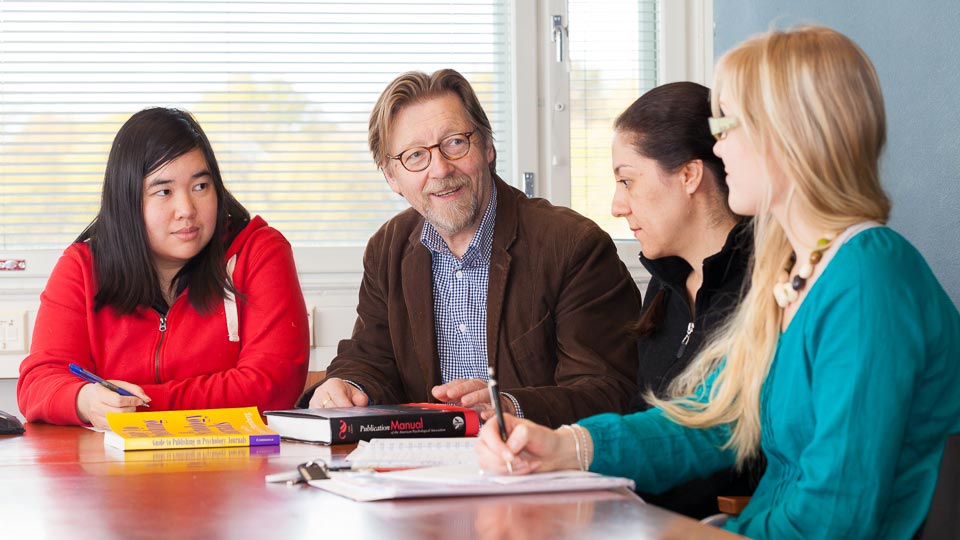Master's Degree Programme in Education and Learning
Prepares you for various tasks in the field of education, both nationally and internationally.
Watch the webinar recording from UTU Virtual Open Week 2025!
Earn a degree in Finland in the field of education with a combination of theory and practice! The EdLearn programme aims to train experts in the areas of research of learning and education. This is achieved by approaching education from both micro (e.g. teaching and learning) and macro level (e.g. sociology of education) perspectives throughout the basic studies and electives as well as in the Master's theses.
The Master's Degree Programme in Education and Learning does not provide the students with formal teaching qualification.
Throughout the studies, a emphasis is placed on students’ research skills.
Applicants also have an opportunity to apply for a double degree option called the Finnish-German Master Programme in Education, with part of the degree studies completed at the University of Regensburg, Germany.

Entry requirements
General Requirements
You are an eligible applicant for Master’s studies if
- you have a nationally recognized first cycle degree – typically a Bachelor’s degree – from an accredited institution of higher education and (if applicable in the country of the degree) from a nationally accredited degree programme
- your degree corresponds to at least 180 ECTS (European credits) or to three years of full time study
- your degree gives eligibility to master level studies in the country where it was issued
- Please see in more detail: https://www.utu.fi/apply
Language Requirements
Applicants must have excellent English language skills and a certificate that proves those skills. You can indicate your language skills by taking one of the internationally recognized English language tests.
Applicants must reach the minimum required test results to be considered eligible to be accepted to the University of Turku. No exceptions will be made. Read more about the language requirements, recognized qualifications, required levels and exemptions here.
Study right
Please note that it is not possible to have more than one Bachelor’s or Master’s study right at the same Faculty. Therefore, when accepting an offered study place, the student will lose any previous BSc. or MSc. study right at the Faculty of Education at the University of Turku.
Before you start preparing your application, always read the full admission requirements on the application portal Studyinfo.fi
Who can apply?
Persons who have completed a Bachelor’s degree in education, adult education or special education are eligible to apply to the programme.
Also, applicants who have a Bachelor’s degree from other fields of study, and who have either an official teacher’s qualification, or who can prove a clear affinity to educational sciences, are eligible to apply to the programme.
NB. Applicants who have completed a Finnish first-cycle university of applied sciences degree (ammattikorkeakoulututkinto) must have either completed basic and intermediate studies (altogether min. 60 ECTS) in education, special education or adult education, OR have completed basic studies (min. 25 ECTS) in education and can prove a clear affinity to educational sciences are also eligible to apply to the programme.
Please, read the full admission requirements for details.
The decision for admission will be based on the evaluation of:
- verified proficiency in English language
- programme specific eligibility
- previous degree(s) and motivation letter
Programme in brief
The Master’s degree in Education and Learning is a two-year programme (120 ECTS).
Teaching formats vary across courses and include for instance lectures, seminars, small group projects in order to provide a variety of learning experiences.
The Curriculum of the Master’s Degree Programme in Education and Learning with course descriptions can be found here: EdLearn Curriculum
The studies are divided into different study modules as follows:
Orientation and general studies 21 ECTS
Advanced studies in Educational Sciences 74 ECTS
Elective or minor studies 25 ECTS
The University of Turku fosters students' professional growth and global perspective by promoting internships and student exchanges. Every degree student can take advantage of these opportunities – all internships come with a guaranteed subsidy, and every exchange programme includes a grant.
Does this page answer your questions about the programme's content and academic matters? If not, contact education@utu.fi.
The Master’s degree in Education and Learning prepares its students for various tasks in the field of education, both nationally and internationally.
The EdLearn Programme aims to train experts in the areas of research on learning and education. This is achieved by approaching education from both micro (e.g. teaching and learning) and macro level (e.g. sociology of education) perspectives throughout the basic and advanced studies, as well as in the electives and the Master thesis.
Besides educational content knowledge, the curriculum also aims to develop transferrable skills:
- learning skills (e.g. critical thinking, problem solving and metacognition)
- life skills (e.g. communication, collaboration and cultural awareness)
- literacy skills (e.g. ICT, media, mathematical and scientific literacy).
These skills are addressed throughout the curriculum through content, study arrangements and in the Master's thesis project. The Master's thesis is also considered an important opportunity for specialisation within the Programme.
As a part of the advanced studies, the students write a Master’s thesis on the field of educational science. A Master’s thesis should demonstrate the student’s
- ability to think scientifically,
- mastery of the required research methods,
- familiarity with the topic of the thesis, and
- ability to communicate in a scientific context.
The Master’s thesis research in the Programme is divided into two main research areas that correspond with the research in the departments of the Faculty of Education: 1) research related to learning and instruction, and 2) research related to educational policy and sociology of education.
In the area of learning and instruction, the themes of the theses can relate to e.g. the following main areas of research:
- Teaching and teacher education
- Higher education, professional development and workplace learning
- Language learning, teaching and linguistic diversity in education
- Mathematics and science education
- Sustainability education and sustainable pedagogies
In the area of educational policy and sociology of education, on the other hand, the theses can relate to e.g. the following themes:
- comparative research on education systems and education policies,
- young people’s educational transitions and trajectories,
- educational inclusion, equity and justice, and
- higher education, lifelong learning and working life.
In both areas, quantitative, qualitative and mixed and /or multi method approaches of data collection and critical analysis are employed, often within comparative designs.
Examples of thesis topics:
- Attendance Policy Moderates the Influence of Achievement Goals and Transfer of Training.
- Analysis of educational transfer and policy changes after PISA in Japan and Finland.
- Achievement goals, learning strategies and exam performance in English learning: a study among undergraduate EFL learners in China.
- Children with hearing problems in elementary school environments in Pakistan and in Finland.
- Developmental trajectories towards the concept of rational numbers: a latent transition analysis of third to sixth grade students.
- Extracurricular language activities in higher education: perspectives of teachers and students.
The Finnish-German Master Programme in Education is a double degree option that leads to the obtaining of two different degrees: a Master of Arts in Education at the University of Turku and a Master of Arts Erziehungswissenschaft (Educational Science) at the University of Regensburg, Germany. In a similar way to the single degree option, the double degree option takes two years to complete and comprises 120 ECTS credits. The language of study is English.
A maximum of five students among the best scoring applicants from the Master’s Degree Programme in Education and Learning can be admitted for the double degree option. Selected students will spend the spring term of the first year of studies at the Institute of Education of the University of Regensburg. The specific research areas at the University of Regensburg are vocational education and continuing education, professional learning and development.
Visit the website of the University of Regensburg for more information.
Career prospects
Students of the Education and Learning Programme will become experts on research on learning and education. Students will be develop their knowledge base in these areas, and analytical and critical research skills that are applicable in a wide range of educational settings..
Besides educational content knowledge, the curriculum also aims to develop transferrable skills:
- learning skills (e.g. critical thinking, problem solving and metacognition)
- life skills (e.g. communication, collaboration and cultural awareness)
- literacy skills (e.g. information, ICT, media, mathematical and scientific literacy).
The Master's Degree Programme in Education and Learning does not provide the students with formal teaching qualification.
Students of the Master's Programme in Education and Learning will become future experts for public, private and civil society sectors. Graduates of the Programme could work as e.g.
- researchers,
- educational experts,
- coordinators,
- educational consultants,
- educators, or
- administrators.
NB. The Master's Degree Programme in Education and Learning does not provide the students with formal teaching qualification.
After completing the Master's Degree in Education and Learning (Master of Arts degree), students can apply for postgraduate studies for a doctoral degree in Philosophy at the University of Turku.
The Graduates are eligible to apply for a position in the University of Turku Graduate School, UTUGS. The Graduate School consists of 16 doctoral programmes which cover all the disciplines and doctoral candidates of the University.
Together with the doctoral programmes, the Graduate School provides systematic and high quality doctoral training. UTUGS trains highly qualified experts with the skills required for a professional career in research or other positions of expertise.

Student experiences
Podcast: Colours of UniTurku | Bright Red: KATKO
Colours of UniTurku introduces KATKO, the organisation uniting Educational Sciences students at the University of Turku. #utuambassador Almira Yausheva and a member of KATKO Veera Rautio talk about what KATKO is and what activities they do together. Veera also shares a funny story about the wrong delivery place and how it united the members together!


